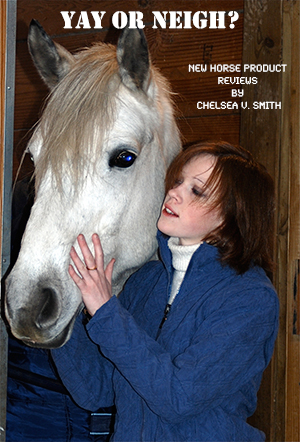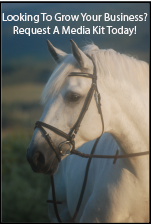he Importance of Equine Dentistry with Nicholas DeDominicis
~ CH Staff
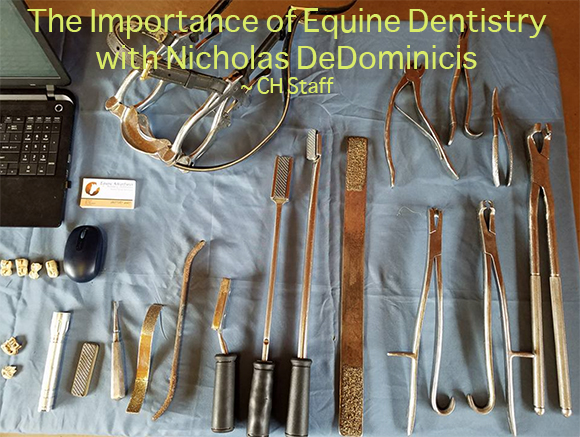
As horse owners we all know that routine dental care for our equines is important to prevent colic, improve nutritional efficiency in the diet and aid in helping the horse accept the bit. Catskill Horse sat down with experienced equine dentist Nicholas DeDominicis to learn from an expert’s perspective how to best prepare for a visit from the dentist, what to expect and why dental care is so important for the wellbeing of your horse. Here’s what he had to say:
CH: How long have you been in the equine dental industry and what inspired you to enter the business?
Nicho: I've always had a passion for working with horses ever since I was a young man and when the opportunity to apprentice with an equine dentist during the summer before my sophomore year of High School I took the opportunity and ran with it. I then found an opportunity through BOCES that allowed me to take classes in the morning and then continue to apprentice in the afternoon during the school year. Then when I graduated in 2011 I went off on my own. Since then I go to different seminars put together by the International Association of Equine Dentistry. This allows me to interact with other equine dentists and learn the newest technologies and techniques to help your horse.
CH: Who did you apprentice with and for how long and what were the most valuable lessons you learned from them?
Nicho: I apprenticed with Darryl Webster for about 3 years. I would see the most important lesson he taught me was to always do your best for the horse.
CH: How long have you been working with horses in general and before you became an equine dentist did you have other plans?
Nicho: My adventure with horses started when I was about 4 years old. I've showed in both Western Pleasure and Gymkhana and when I was about 12, I started working with different equine professionals learning to train horses.
CH: What is the most important thing a horse owner needs to know about the importance of horse dental care?
Nicho: I would say the most important thing horse owners need to remember is that the first part of the digestive system is truly the mouth of the horse. It's the first part of the body that starts breaking down the feed particles so that digestive system can then absorb the nutrients. Secondly, that we need to make sure our horses are physically capable to do things that we require of them. For example hooks and waves can make it difficult for horses to set or collect their heads.
CH: What can a horse owner do to prepare for your visit and what should they expect? How long will it take?
Nicho: There's not too much that a horse owner can do to prepare for a visit other then try to make sure the horse is relaxed, and in his normal eating patterns. We sometimes do move around the store a little bit but through Natural Horsemanship we form a relationship with the horse that allows us to float their teeth. The whole procedure normally takes approximately 30 to 40 minutes.
CH: Why is regular dental care important?
Nicho: Regular Dental visits are important as regular maintenance to keep the horse's mouth free of sores and grinding correctly. By grinding correctly with their teeth this increases the longevity of their teeth helping them to work for years to come. Also by reshaping the first premolar (the bit seat), we make it more comfortable for the bit to go in the horse's mouth giving the rider better control and a safer ride.
CH: Do vets offer dental care? What is their training in the subject to your knowledge?
CH: Vets do also offer dental care however it is not their primary focus and their 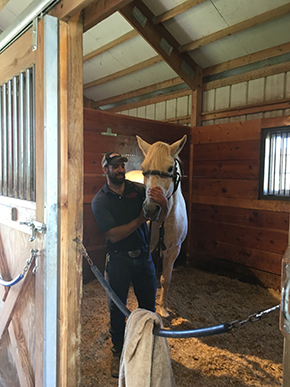 veterinary practices, and for that reason a trained equine dentist is a better way to go. Many veterinarians are not confident or practice regular maintenance floating, only emergency dental care.
veterinary practices, and for that reason a trained equine dentist is a better way to go. Many veterinarians are not confident or practice regular maintenance floating, only emergency dental care.
CH: I understand your apprenticeship and experience is more extensive than some vets that are fresh out of school anyway. What advantage does that give you in working with the horses?
Nicho: During my apprenticeship I had the advantage of seeing hundreds of different horses and learning what to do with that type of mouth. This helps me so even when I come across a new problem I can use the problems that I've already seen to figure out the best solution. This accompanied by my lifetime of horseman allows me to help the horse with little to no stress.
CH: Do you use a power float or do teeth by manual filing?
Nicho: I use all manual floats with a carbide steel blade this allows me to reshape and remove sharp points from the teeth with little to no stress to the horse.
CH: What do you believe is the advantage of one over the other if any?
Nicho: In my personal experience I've seen power floats make noise and vibrations that irritate horses and for this reason most of the time the horse require sedation. In my opinion this is an unnecessary thing to do when there are manual floats available that we can work with the horse with little to no stress.
CH: At what age should a horse’s teeth be floated and how often thereafter?
Nicho: Horse’s teeth should start being checked at approximately a year and a half we are looking to make sure that all the caps or baby teeth come in correctly and thereafter are replaced by the permanent teeth correctly. After your horse is approximately four and a half they should be on a regular schedule to be floated yearly.
CH: What common problems do you see in a horse’s mouth? Please be as technical as you’d like to explain.
Nicho: Traditionally floating is simply taking off the sharp points so your horse is more comfortable to chew its food. However, through research and development, we now also reshape the teeth to be more efficient and to help prevent the sharp points from coming back as quickly. We do this by removing things like waves and hooks and by making sure the horse has the correct angle on their occlusive surface.
CH: Do you believe wolf teeth need to be removed for bit comfort?
Nicho: Wolf teeth in most cases are not connected to the skull or mandible like normal 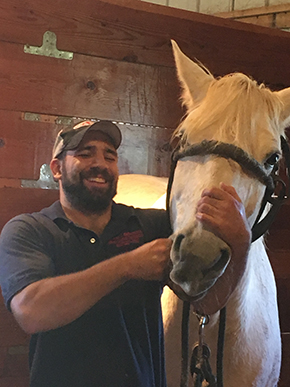 teeth, this causes them to float in the gum. This most often causes pain or unwanted pressure underneath the gum line with a bit in the mouth. For this reason I recommend removing the wolf tooth from every horse I come across because chances are even if it is a broodmare now there is a chance that it could be a riding horse for child later on in its life.
teeth, this causes them to float in the gum. This most often causes pain or unwanted pressure underneath the gum line with a bit in the mouth. For this reason I recommend removing the wolf tooth from every horse I come across because chances are even if it is a broodmare now there is a chance that it could be a riding horse for child later on in its life.
CH: Are there any other specific things you do in the horse’s mouth for bit comfort?
Nicho: Other than remove the wolf teeth we also reshape the first premolar in your horse's mouth to make it a bit more comfortable this is called a bit seat. This ensures more comfort when the bit is in a horse's mouth and also that it is balanced on both sides of the mouth.
C: Since you began your practice what is one of the biggest problems you faced?
Nicho: I would say since I started my practice the biggest issue I run into is owner education. No matter how many seminars or events I go to, there are so many people that don't understand the importance of having a horse's teeth floated for both their safety in riding and the horse’s ability to digest their food.
CH: What geographic area do you serve?
Nicho: I am based out of Otego New York but I service primarily the area between I-88 and Rte 17 (Catskill Mountains Region).
CH: How can people best contact you?
Nicho: My cell phone is the most frequently checked item however I am available through both Facebook and email.
For more info or to book an appointment with Nicho here are his details:-
Nicholas C. DeDominicis
Equine Dental Technician
(607) 287 9567
1155 County Highway 6
Otego, NY 13825
ndedominicis113@gmail.com

